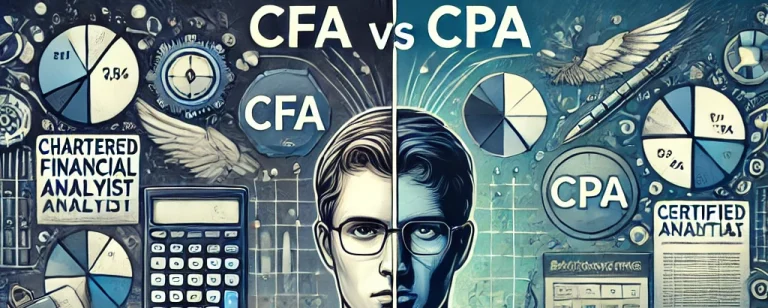For finance professionals looking to further their career pursuits within investment analysis or accounting, one of the critical decisions will be whether to opt for a CFA or a CPA. While both qualifications are highly regarded in their professional areas, each is suitable for a specific vocational direction with its own skill set. It is important to comprehend those differences in focus areas, exam structures, career prospects, and salary potential to make the right choice.
What is CFA?
CFA full form is Chartered Financial Analyst. It is an international-level professional designation awarded to financial analysts engaged in effective investment management, money management, and related fields. This certification accredited by the CFA Institute is recognized as the highest qualification in the investment field. This certification is great for those aspiring to work as financial analysts, portfolio managers, or investment bankers.
CFA Syllabus
- The CFA program focuses on the most important components of the finance profession such as investment, management, financial analysis & ethical principles, and quantitative methods.
- It explains how to appraise investments, interpret reports, and effectively operate investment portfolios toward enhanced growth with reduced risks.
- Teaching concerning Ethics as well as professionalism is vital within the CFA course hence charter members will act within the boundaries of decency tomorrow.
CFA Exam Structure
- The CFA designations are comprised of a sequence of three distinct comprehensive exams, which are organized in ascending order, namely Level I, Level II, and Level III.
- The Level 1 Exam consists of 180 multiple-choice questions split between two 135-minute sessions.
- The Level II Exam consists of 22 item sets of vignettes with 88 multiple-choice questions about them. The exam divides into two sessions, both 132 minutes.
- The Level III Exam consists of vignettes with associated multiple-choice questions and essay questions related to vignettes. Beginning in 2025, the Level III Exam will offer three specialized pathways for a more directed career path: Private Wealth, Private Markets, and Portfolio Management. Like Level II, this exam also had two 132-minute sessions.
What does a CFA Charterholder do?
CFAs function more as analysts and advisors. They pour through past financial statements, looking for patterns and opportunities to increase growth and profitability—then make specific recommendations as to how the company or individual client’s financial goals can be achieved.
- CFAs are experts in assessing the market viability of securities, including stocks, bonds, derivatives, and others.
- They can design and handle an investment portfolio according to the risk levels and financial goals of a client.
- They know the ethical issues involved are essential for upholding the moral principles behind financial decision-making.
Career Opportunities for CFA
- Portfolio Manager: Chiefly responsible for managing the investment portfolios of individuals, companies, or institutions. They emphasize asset allocation and risk management.
- Financial Analyst: Studying various aspects of the market, companies, or the economy to decide the best course of investments.
- Equity Research Analyst: Extends a helping hand to enterprises and individuals by researching equities extensively and suggesting which stocks should be bought or sold.
- Investment Banking Professional: Guiding firms on mergers, buyouts, capital restructuring, and other measures to secure internal or external funding.
What is CPA?
CPA full form is Certified Public Accountant. It is a global professional title and accentuates the expertise in accounting, auditing, taxation, and financial reporting. In the USA, the CPA title, in that sense, has jurisdiction of the American Institute of Certified Public Accountants. People who wish to pursue a career in accounting, auditing, tax consulting, and even financial advice design the title.
CPA Course
- The CPA program incorporates critical components such as financial accounting, auditing, tax, business laws, and appropriate regulatory frameworks.
- It also provides practical knowledge on the preparation, interpretation, and even auditing of financial reports within the structures of GAAP (Generally Accepted Accounting Principles) and other relevant laws.
- Accountants are business strategists, risk managers, and specialists in corporate governance, forming an important part of such decision-making processes.
CPA Exam Structure
- The CPA examination consists of four sections, which assess the core accounting and finance principles and techniques from various perspectives:
- Auditing and Attestation (AUD): Deals with audit techniques, internal controls, and regulatory assurance.
- Business Environment and Concepts (BEC): Publishes materials on organizational structure, economy, management of finance, and management information systems.
- Financial Accounting and Reporting (FAR): Deals with accounting and general concepts regarding preparing financial statements and their associated practices.
- Regulation (REG): Incorporates business regulations, ethical practices, and taxation policies at the national level.
- The exam has four sections; candidates must complete them all within 18 months after sitting for the first.
What a CPA Can Do?
CPAs can generate, analyze, and certify financial statements, prepare tax returns, and provide advisory services to help clients become more profitable, reduce costs, or minimize their tax burdens. They can also perform audits, either internal or external, to validate the finances of a company.
- Auditing Capabilities: Skills in the enforcement of best accounting practices through the carrying out of audit exercises and finding of variances.
- Tax Issues: Knowledge of how to balance tax payment with business expansion, considering tax issues in terms of past distance from current place.
Career Opportunities for CPA
- Public Accountant: Accountancy, taxation, audit, and business consulting services are provided to individuals and entities, such as corporations, government, and nonprofit agencies, by public accountants.
- Internal Auditor: Evaluation of the adequacy and effectiveness of internal control systems and processes with operational and financial practices within an organization and concerning relevant legislation.
- Tax Consultant: Professional service that involves providing tax planning, tax compliance or return preparation, and ways of reducing tax.
- Financial Manager: Helping firms discern financial options and enhance their accounting standards.
CFA vs CPA: Key Differences
It’s important to compare the differences between CFA and CPA to determine which certification is preferable to your career goals. Both certifications impart certain skills, areas of focus, and job opportunities, but they belong to different fields in the finance sector.
| Aspect | CFA (Chartered Financial Analyst) | CPA (Certified Public Accountant) |
| Focus Area | Investment analysis, portfolio management, ethics | Accounting, auditing, taxation, and financial reporting |
| Ideal for | Financial analysts, portfolio managers, investment bankers | Accountants, auditors, tax advisors, financial consultants |
| Exam Structure | Three levels focusing on investment management | Four parts focusing on accounting and regulatory standards |
| Skills Required | Strong quantitative and analytical skills in finance | In-depth knowledge of accounting principles and tax laws |
| Global Recognition | Globally recognized in the investment industry | Widely recognized in accounting and financial reporting |
| Career Path | Primarily in investment firms, asset management, and equity research | Public accounting firms, corporate finance, and tax advisory |
| Difficulty Level | High, with a strong emphasis on financial analysis and ethics | High, with a focus on detailed accounting standards and regulations |
| Salary Potential | High earning potential, especially in investment roles | Competitive salaries, especially in accounting and auditing roles |
| Professional Body | Chartered Financial Analyst (CFA) Institute | American Institute of Certified Public Accountants (AICPA) |
CFA vs CPA Salary
- CFA Wage: Charterholders of the CFA tend to earn more, although in other positions, such as portfolio managers and investment bankers, CFA registration will generally earn much more. Starting CFA salaries are about 7 lakh – 12 lakh, but one can earn above 20 lakh – 35 lakhs per annum in more senior positions.
- CPA Wage: Certified Public Accountants are also well compensated for their work even though most of it is in external audit or public accounting. Entry-level salaries vary from 6 lahks up to 15 lahks, bypassing 22 lahks up to 40 lakhs, even in the case of senior financial positions.
CPA vs CFA Canada
- CFA in Canada: Earning a CFA is a valuable asset in Canada, particularly in financial centres such as Toronto and Vancouver. It suits individuals who wish to pursue a career in asset management, investment banking, and financial advisory.
- CPA in Canada: It is one of the basic requirements for a person to practice accounting in Canada. A person without CPA certification cannot take any position within any Canadian company, such as financial reporting, auditing, tax, or compliance matters.
CFA vs CPA FAQs
Is CPA better than CFA?
The CPA is great if you want to raise the finance department at a corporate business and ultimately become the CFO or if you want to rise the ranks at a public accounting firm. The CFA credential, by contrast, is great if you want to work at a bank, particularly in investment management or equity research.
Who earns more, CFA or CPA?
It is difficult to determine which of these careers offers a higher salary, as the salary of a CFA or CPA can differ based on several factors. However, generally, CPAs tend to earn more than CFAs in India.
What are CFA level 1 fees?
The CFA level 1 cost for 2024-2025 is approximately INR 79,000 for early registration and INR 1,00,000 for standard registration. The CFA exam structure consists of three levels: Level 1, Level 2 and Level 3.
Which is more worth it as career CFA or CPA In Canada?
CFA would be more applicable for such positions, while CPA would be more useful in accounting, tax, and regulatory functions in Canada.
Can I do CFA with BCom?
Yes, many students pursue the CFA certification alongside their undergraduate or graduate studies.


